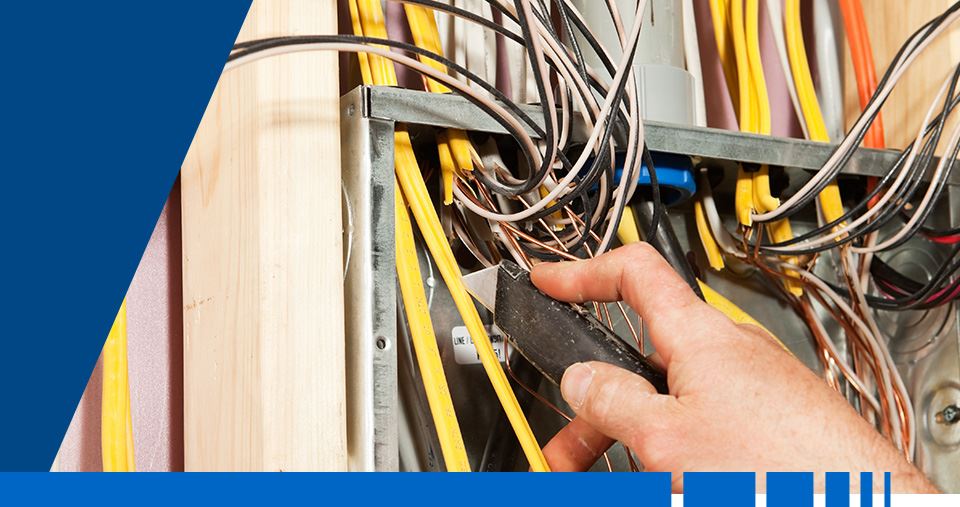
Atlanta Electrical Repairs
Seasoned Electricians Serving the Atlanta Metro
If you suspect something might be wrong with any part of your home's electrical system, you should not wait to contact a professional electrician. Electrical issues can pose serious risks, including fire hazards, electrical shocks, and damage to your appliances. Waiting to address these problems can worsen the situation, leading to more expensive repairs, more extensive damage, and even potential safety threats to you and your family.
At R.S. Andrews, we have the expertise and equipment necessary to diagnose and resolve electrical issues effectively and safely. We prioritize your satisfaction by maintaining high standards of workmanship and using top-quality materials, and our commitment to safety means we adhere to all local regulations and codes. Additionally, we offer prompt and dependable service, understanding that electrical problems demand immediate attention to prevent further complications.
We offer a 100% satisfaction guarantee, so when you need Atlanta electrical repairs, give us a call at (470) 264-8128 or contact us online!
What Are Some of the Most Common Home Electrical Problems?
Our team at R.S. Andrews is familiar with the things that can go wrong with your home’s electrical system. We can complete a thorough inspection, diagnose the underlying issue, and explain what we need to do to fix it.
Our Atlanta electrical repair experts are prepared to help you handle many common problems, including:
Overloading Circuits
Overloading circuits occur when the amount of electrical power that is drawn exceeds the maximum capacity of the electrical circuit. This situation often happens when too many high-powered appliances or devices are plugged into a single circuit, surpassing the designated amperage rating. Common perpetrators include air conditioners, space heaters, microwaves, and other energy-intensive appliances often running simultaneously. When a circuit is overloaded, it forces the electrical wiring to handle more electricity than it is designed for, which can lead to overheating of wires, degradation of insulation, and increased risk of electrical fires. Additionally, overloading can cause frequent tripping of circuit breakers, leading to interruptions in power and potential damage to connected equipment and appliances.
Short Circuits
A short circuit occurs when an electrical current travels along an unintended path with little or no electrical resistance, causing a sudden and dangerous surge of electricity. This typically happens due to exposed wiring or when the wiring insulation is damaged, allowing electric currents to bypass the designated circuit and creating a direct flow between the power source and the ground. Short circuits can also be caused by faulty appliances or overloaded electrical outlets. Because the path of least resistance allows for a higher-than-normal flow of current, it can generate significant amounts of heat, leading to melted wires, burns, or even fires. Additionally, short circuits can cause circuit breakers to trip or fuses to blow, resulting in power outages and potential damage to electrical appliances connected to the affected circuit.
Ground Faults
A ground fault occurs when an electrical current finds an unintended path to the ground, often through a person's body or an appliance, instead of following its intended circuit. This can happen when the insulating materials around wires become worn or damaged or when electrical components are exposed to moisture, leading to a leakage of electrical current. Ground faults are particularly dangerous because they can result in severe electrical shocks, potentially causing injury or even death. This risk is heightened in areas with high humidity or where electrical devices are used near water, such as bathrooms, kitchens, and outdoor environments.
Faulty Bulb Sockets
A faulty bulb socket is a condition where the socket that holds and connects a light bulb to the electrical circuit is damaged or defective. This can be the result of simple wear and tear, corrosion, poor manufacturing, or improper installation. Faulty sockets can cause electrical arcing where contacts are loose, creating small, high-temperature sparks. This arcing can produce heat and potentially ignite surrounding materials, presenting a serious fire hazard. Moreover, a compromised socket may overload the circuit if it causes repeated attempts to draw power inconsistently, leading to tripped circuit breakers or blown fuses. Over time, a faulty socket can also lead to damage to the light bulb itself, reducing its lifespan and creating additional costs for frequent replacements.
Loose Connections
Loose connections occur when electrical wires are not securely attached to their terminals, whether due to improper installation, damage, or natural loosening over time. This can happen at various points within your electrical system, including outlets, switches, and junction boxes. Loose connections disrupt the flow of electricity, creating a variety of potential issues and hazards.
Blown Fuses
A blown fuse occurs when an electrical fuse – designed to protect a circuit from overcurrent – melts or breaks due to exceeding its maximum current capacity. Each fuse within an electrical system is rated for a specific current level, and when the flow of electricity surpasses this threshold, the fuse element heats up and melts, effectively breaking the circuit to prevent further electrical flow. This safety feature helps protect your home from potential damage caused by circuit overloads, short circuits, or defective components that might otherwise lead to overheating and fires.
Faulty Wiring
Faulty wiring refers to any condition where the electrical wiring within a home does not perform as intended, often due to defects in design, materials, or installation. This can include issues such as frayed or exposed wires, poor connections, outdated installations that do not meet current electrical codes, and wiring that is undersized for the electrical load it carries.
Signs Your Home Needs Electrical Repairs
Many electrical problems can quickly become emergencies if they are not addressed quickly. Fortunately, our team is available 24/7, so do not hesitate to request service if you spot signs of trouble.
Reach out to our Atlanta electrical repair technicians if you notice any of the following red flags:
Frequent Circuit Breaker Tripping
Frequent circuit breaker tripping is a sign that your electrical system is overwhelmed, potentially due to overloading circuits, short circuits, or ground faults. When too much current flows through the system, the breaker trips to prevent overheating and potential fires. This is often due to inadequate electrical infrastructure in older homes that were not designed for modern power demands. Ignoring this issue can result in severe overheating, wiring damage, and even electrical fires. One of our professional electricians can assess your system’s load distribution and may attempt to redistribute the load or recommend upgrades to your electrical panel.
Flickering or Dimming Lights
Flickering or dimming lights can be more than a minor annoyance – they can signal underlying electrical issues like loose wiring, poor connections, or problems with the fixture itself. Often, fluctuating lighting can indicate a faulty bulb socket, but it can also be a sign of more serious wiring issues or circuit overload. Loose wiring not only affects the performance of lighting but also poses a fire risk, as it can generate heat and sparks. Inconsistent voltage can also damage other electronic devices and appliances. We can identify and address the root cause of the issue affecting your lights.
Dead Outlets
Dead outlets no longer provide power, often due to tripped circuit breakers, blown fuses, or faulty wiring. While a single dead outlet might seem insignificant, it can be an indication of a larger issue within your electrical system. Dead outlets can result from damaged or aging wiring, which poses a significant fire hazard. Additionally, if an outlet plate feels warm or you detect a burning odor, it should not be used until checked by a professional. Ignoring dead outlets can exacerbate underlying electrical faults, leading to electrical shocks or fires. We can determine whether the issue is localized or symptomatic of a broader problem.
Sparking Outlets or Switches
Sparking outlets or switches are a clear sign of immediate danger, often caused by short circuits, water exposure, or aging components. When electrical connections are loose or degraded, electricity can arc through open air, resulting in sparks. This is highly dangerous, as it can ignite surrounding materials and cause an electrical fire. Outlets in areas exposed to moisture, such as kitchens and bathrooms, are particularly prone to this problem. The sparks can also damage your appliances, leading to costly replacements. We can inspect the entire circuit and replace faulty components to restore safety to your home’s electrical system.
Burning Smell or Scorched Outlets
A burning smell or scorched marks around outlets or switches are serious indicators of overheating, which often result from loose connections, overloaded circuits, or degraded wiring. Overheating happens when insulation on wires breaks down, causing wires to spark and emit heat. This can quickly escalate into an electrical fire if not addressed promptly. We can locate the source of the overheating, replace damaged wiring, and confirm secure connections to prevent future risks.
Can I DIY Electrical Repairs?
There are many reasons why DIY electrical repairs are dangerous. Live wires and electrical current can give you a serious shock or worse. You could be electrocuted, and there is also a fire risk. This puts you, your family, people nearby, and your home/possessions at risk.
If you manage to complete the work without getting hurt, there’s the ongoing concern that anything you’ve done incorrectly can cause a fire later on. Your work will likely not be done to code and could make the electrical problems in your home worse and more costly to repair. DIY electrical work is simply not worth the risk. For your well-being and peace of mind, call a professional Atlanta electrician to do the job safely — and ensure it’s done right.
We are ready to meet your Atlanta electrical repair needs, so call (470) 264-8128 or contact us online today!

See What Our Satisfied Customers Say
Over 6,800 Positive Reviews On Google!
-
“He said I also needed my filter changed, so he did that. It was so hot and he had to go under my home. He was so cheerful about it. My unit is back to cooling and my home feels wonderful.”- Shelley A.
-
“Petronio the Service Tech that came out to get my AC system cooling again was awesome. he was professional and had an excellent demeanor and I immediately felt very comfortable knowing he was going to shoot straight with me.”- Greg H.
-
“The T & T install team did a fine job as well, and they were really nice young men. We had 2 new high efficiency heat pumps installed: one of which is zoned.”- Danna S.


Here Are A Few Reasons To Smile:
-
Trusted Since 1968Decades of reliable service in your community.
-
Our Unmatched Customer Service
-
Our Money-Saving Tips & Special Offers
-
Our Industry Membership, Accolades, & Licenses